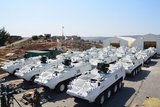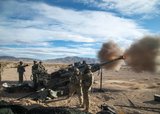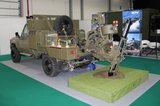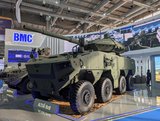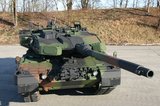UK MoD issues Saab DFWES support contract
Saab has signed on to support the British Army’s Direct Fire Weapon Effects Simulator System (DFWES) under a new contract with the UK Ministry of Defence, announced on 31 March. The agreement is worth approximately £20 million.
Under the three year contract, Saab will support and service the DFWES, which is used by the British Army for live collective Battle Group training. Saab has supported the system since 1994.
DFWES is an appended precision laser based tactical engagement system for vehicles/armour and anti-tank weapons in force-on-force exercises to simulate the effect of weapon engagements that enables realistic and challenging training.
Henrik Höjer, vice president and managing director training and simulation, Saab, said: ‘This new contract, extending the use of the capability, is proof of the strong relationship between Saab and the British Army, and a renewal of our commitment as a highly trusted overall training provider to a leading military customer.’
More from Land Warfare
-
![World Defense Show 2026: Large vehicles and counter-drone systems take the limelight]()
World Defense Show 2026: Large vehicles and counter-drone systems take the limelight
Visitors who attended the first World Defense Show four years ago continue to speak of the difficulties they faced with poor facilities and power problems. This year’s event emphasised its status as one of the major defence expositions and as a place where regional players and those less welcome at other shows could take centre stage.
-
![MKJ Warrior Series — The Nett Warrior Qualified Connector for Today’s Soldier Systems]()
MKJ Warrior Series — The Nett Warrior Qualified Connector for Today’s Soldier Systems
ITT Cannon’s MKJ Warrior connectors are designed for the harshest environments, delivering mission critical comms, navigation and USB data/power.
-
![Active vehicle protection comes to the forefront as Trophy and Iron Fist secure contracts]()
Active vehicle protection comes to the forefront as Trophy and Iron Fist secure contracts
Experience on the battlefield is accelerating the adoption of active protection systems as technologies continue to evolve to reflect shifting global defence needs.









